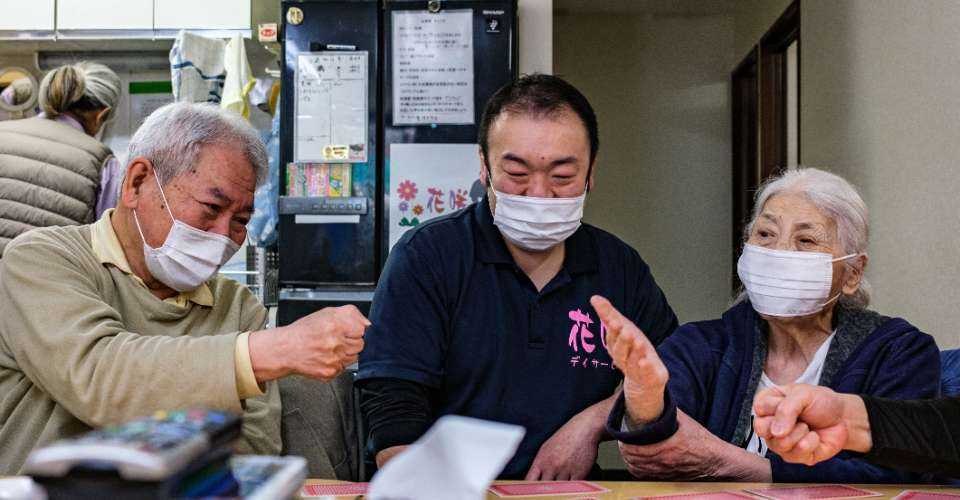
A staff member with elderly people at the Hanasaki daycare center in Tokyo on March 30, 2022. (Photo: AFP)
For Westerners, science has served as the cornerstone of their existence for centuries, a development significantly influenced by Christianity.
By demystifying the natural world, unlike the animistic or Shinto beliefs that imbue nature with divinity, Christianity paved the way for scientific inquiry.
This shift not only fostered an environment conducive to scientific exploration but also laid the groundwork for the advancements that have shaped our comfortable present and promising future.
One of the main goals of Western science has always been the desire to live a long, fulfilling life, so much so that it always thought it would be a universal aspiration. However, looking at a recent survey conducted by the Research Institute for Centenarians we might have to rethink this assumption.
The survey has unveiled a striking disparity in attitudes towards longevity across different countries, with Japan notably standing out for its lack of enthusiasm towards living to be 100 years old.
This is a country that has over 86,500 centenarians, with the majority being women. Relative to its population, it boasts one of the highest numbers of centenarians in the world.
"The prospects of living a longer life are closely associated with burden rather than celebration"
Despite this, less than 30 percent of Japanese respondents favored the prospect of a centennial life. Coupled with the lowest reported levels of happiness among the six nations surveyed, one must wonder: what underlies this pronounced reluctance and unhappiness among the Japanese population?
Japan is well-known for its robust work ethic and corporate culture, which are frequently marked by extended working hours and a deep commitment to one's professional duties. This culture, while undoubtedly contributing to Japan's economic success, has also led to societal issues such as karoshi (death by overwork), a term sadly unique to the country.
The number of recognized cases of karoshi has been in the hundreds annually, but this does not capture the full scope of the problem as not all cases are reported or recognized officially.
The pressure to maintain a high level of work intensity well into what many would consider the retirement years could understandably diminish the appeal of living to 100.
Additionally, while the Japanese culture deeply respects the elderly, so the rapid aging of Japan's population has put a significant strain on both its economy and social welfare systems. This contributes heavily to a general pessimism about aging as the prospects of living a longer life are closely associated with burden rather than celebration.
The fear of becoming a societal burden, coupled with concerns about isolation and the challenges of finding adequate care, significantly impacts the desirability of reaching 100.
Japan also faces a notable issue of social isolation, particularly among its elderly population. Instances of kodokushi, or lonely deaths, where thousands of individuals pass away unnoticed and alone, are distressingly common.
The fear of isolation and loneliness in old age, without the prospect of family or social support, can understandably lead many to view a longer life skeptically.
"The prospect of enduring long periods of ill health or diminishing mental faculties is a daunting one"
Economic stagnation and the uncertainty of social security systems in Japan also play crucial roles in shaping attitudes towards aging.
With a shrinking workforce and a pension system under strain, younger generations are increasingly skeptical about their economic security in old age.
This skepticism extends to the overall optimism towards living a long life, where economic challenges overshadow the potential joys of extended longevity.
While Japan boasts one of the highest life expectancies in the world, the quality of life in those later years is therefore a growing concern. The prevalence of diseases, such as heart disease and dementia, poses significant challenges to the health system and the individuals and families affected by these conditions.
The prospect of enduring long periods of ill health or diminishing mental faculties is a daunting one that may detract from the desire to live to or beyond 100.
There would need to be a huge cultural shift in the workplace to balance productivity with well-being, allowing individuals to envision a retirement that is both desirable and feasible.
The hesitation among the Japanese population to eagerly pursue a life spanning a century reveals much about the misplaced presumptions inherent in Western culture, which often extends its aspirations to a global context.
This reflects a deep-seated mindset inherited from the colonial era, which has significantly influenced the cultural dominance of the West.
In this light, Japan's perspective could illuminate the simplistic notion that a longer life automatically equates to increased happiness.
The societal and individual hurdles encountered by Japan's elderly could foreshadow issues likely to be encountered by other nations experiencing demographic declines, such as China.
This scenario suggests a valuable lesson: the importance of prioritizing the 'quality' of life over mere longevity. Embracing the richness of present experiences may indeed offer a more fulfilling approach to life.
*The views expressed in this article are those of the author and do not necessarily reflect the official editorial position of UCA News.


